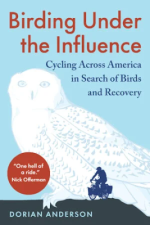AN alert against interfering with nature has been sounded by an American ornithologist.
From installing nestboxes to introducing or re-introducing species, organisations and individuals often like to experiment in the belief that they are doing good.
But Dorian Anderson warns: "Ecosystems do not lend themselves to controlled manipulation.
"Often deleterious outcomes are not recognised until the balance has been disturbed and the possibility for remediation has expired."
In a book recently published in the UK, the author makes some interesting observations about birds and birding.
Shrikes come under his scrutiny as "a rare example of a predatory songbird" while later he notes that "birders generally find ptarmigans but rosy-finches often find birders".
Anderson makes no attempt to hide his disdain for those birders who like to keep their discoveries under wraps.
"Most are friendly and co-operative," he writes. "Sharing sightings strengthens the communal experience.
"But some birders - an insignificant fraction - bow to competitive impulses by keeping about rare birds to themselves."
The book also contains also a fascinating section on migration - particularly that of passerines en route to or from Central and South America either over land or, if they opt for the more dangerous 600-mile route over the Gulf Mexico.
Birding Under The Influence - Cycling Across America in Search of Birds and Recovery is published in paperback by Chelsea Green (www.chelseagreen.com) and available wherever books are sold.
From installing nestboxes to introducing or re-introducing species, organisations and individuals often like to experiment in the belief that they are doing good.
But Dorian Anderson warns: "Ecosystems do not lend themselves to controlled manipulation.
"Often deleterious outcomes are not recognised until the balance has been disturbed and the possibility for remediation has expired."
In a book recently published in the UK, the author makes some interesting observations about birds and birding.
Shrikes come under his scrutiny as "a rare example of a predatory songbird" while later he notes that "birders generally find ptarmigans but rosy-finches often find birders".
Anderson makes no attempt to hide his disdain for those birders who like to keep their discoveries under wraps.
"Most are friendly and co-operative," he writes. "Sharing sightings strengthens the communal experience.
"But some birders - an insignificant fraction - bow to competitive impulses by keeping about rare birds to themselves."
The book also contains also a fascinating section on migration - particularly that of passerines en route to or from Central and South America either over land or, if they opt for the more dangerous 600-mile route over the Gulf Mexico.
Birding Under The Influence - Cycling Across America in Search of Birds and Recovery is published in paperback by Chelsea Green (www.chelseagreen.com) and available wherever books are sold.




